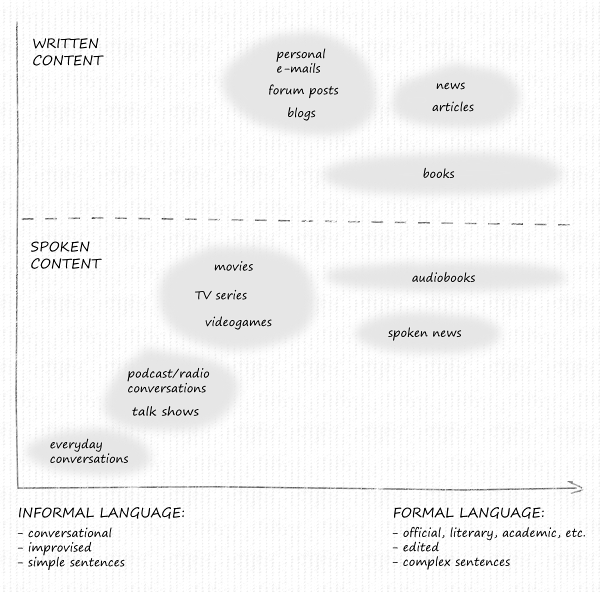Select any word on this page to check its definition and pronunciation
in a dictionary.
Click brown words for a pop-up explanation.
|
Formal and informal English
by Tomasz P. Szynalski
© Tomasz P. Szynalski, Antimoon.com
The most important
piece of advice
for an English learner is to get lots of input.
But not all input is the same. There are,
roughly speaking, two basic types of
English input: formal and informal.
Formal English is used in “serious” texts and situations — for example, in official documents,
books, news reports, articles, business letters or official speeches.
Informal English is used in everyday conversations and in personal letters.
Here is an example of formal English that you might
come across in a book:
As the price of five dollars was reasonable, I decided to make the purchase without further thought.
The same thought would be expressed quite differently in informal English. Here’s an actual example that
I heard from a young American:
It was, like, five bucks, so I was like “okay”.
You need to know formal English because you want to be able to read a book,
give a business presentation or write an official letter.
You also need informal English because you want to be able to understand and communicate
with English speakers in everyday situations.
Differences between formal and informal English
| Formal English |
Informal English |
- Used in official, literary, academic, etc. content.
|
- Used in everyday, personal conversations.
|
- Typically used in careful, edited writing — when the writer has a lot of time
to polish his text. Formal
English also occurs in speech, usually when the speaker
is saying something that was prepared beforehand (for example, reading the news or
delivering an official speech).
|
- Typically used in “improvised” speech — when the speaker is speaking
without preparation, as in a conversation (in real life or over the phone).
Informal English also occurs in writing,
usually whenever the writer is writing quickly and without editing
(for example, in an Internet chatroom or in quick, personal e-mails).
|
- Sentences are longer and more complicated, for example:
Toyota’s US sales bounced back in March as substantial discounts helped
to win back customers who had been shaken by the firm’s mass safety recalls.
|
- Sentences are simpler and shorter, for example:
Did you see Toyota’s sales figures? Looks like the discounts
have actually worked.
|
- The standard of correctness is higher. Some things are
considered correct (or at least acceptable) in informal English, but wrong in formal English.
For example:
- I’ve made less mistakes. (formal: I’ve made fewer mistakes.)
- She’s liking it. (formal: She likes it.)
- I feel real tired. (formal: I feel really tired.)
- You did good. (formal: You did well.)
|
|
| Formal English |
Informal English |
|
-
Because informal English is “improvised”, it is sloppy.
Speakers (and sometimes writers) often do the following:
- Use “delaying expressions” to give themselves time:
Well, I think they should have asked us first, you know?
- Use “correcting expressions” to correct themselves:
He’s not well. I mean, he’s not sick, but he’s very tired.
- Use “qualifying expressions” to show that what they said is not exactly right:
This whole blogging thing is getting kind of old.
|
|
- Informal English contains useful “everyday phrases”, for example:
- Here you are. There you go. (when giving something to someone)
- Excuse me?, Come again? (to ask someone to repeat something)
- What do you mean? (to ask for explanation)
- So, you’re saying that...? (to ask for confirmation)
- Exactly!, I couldn’t agree with you more. (to agree with someone)
- By the way..., Anyway... (to change the topic)
- See you. Take care. (to say goodbye)
|
- A huge number of words and phrases are used mainly in formal English. For example:
nevertheless, to disclose, to constitute, to undertake, daunting, impervious,
anew, truly, solace, to enchant, frantically,
sizeable, to clutch, heyday, as it happens,
upsurge, retrieval
|
- A huge number of words and phrases are used mainly in informal English. For example:
dude, freaking, uh-huh, nope (= no),
to puke, trashy, grownup, awesome, to chill out, stuff,
hard-up, to tick somebody off, to sell like crazy.
|
- Many (but not all) phrasal verbs are avoided.
|
- Phrasal verbs are used frequently. For example, in informal situations, people usually
say found out instead of discovered,
came across instead of encountered and got away instead of escaped.
|
|
|
- Words and phrases are sometimes pronounced in a shortened and simplified way,
e.g. Lemme go!, I’m doin’ fine, Whassup?, Whatcha gonna do?
|
Where do I get formal and informal input?
Here is a handy chart that shows you what types of English (formal, informal or “in between”)
you can get from different sources of input:

|
